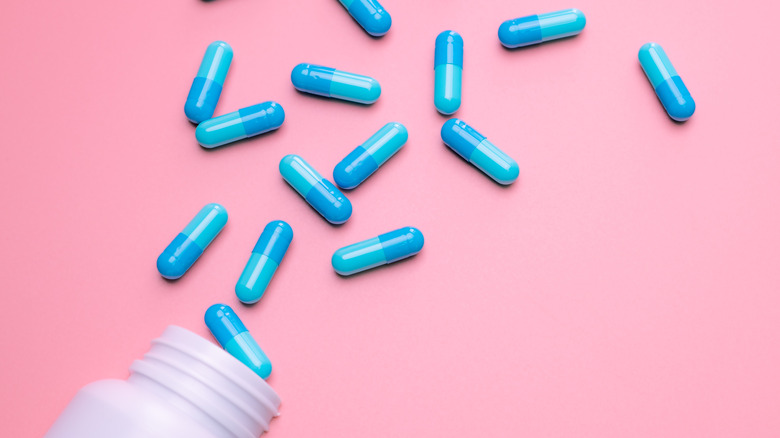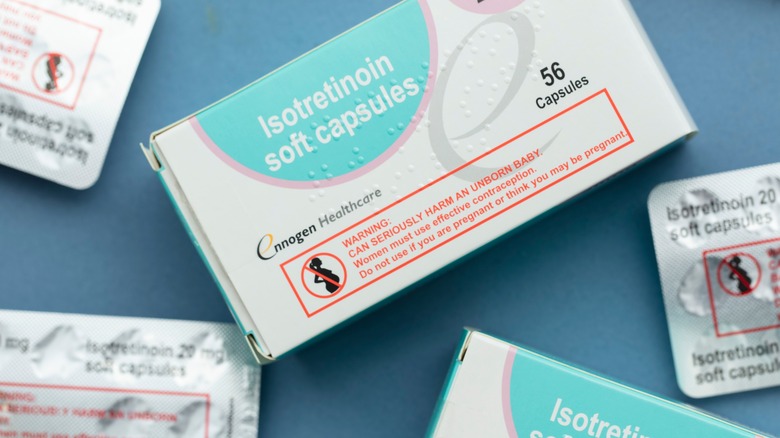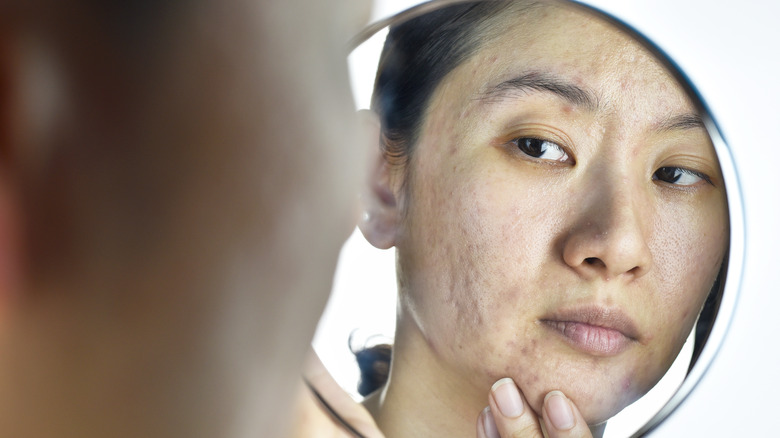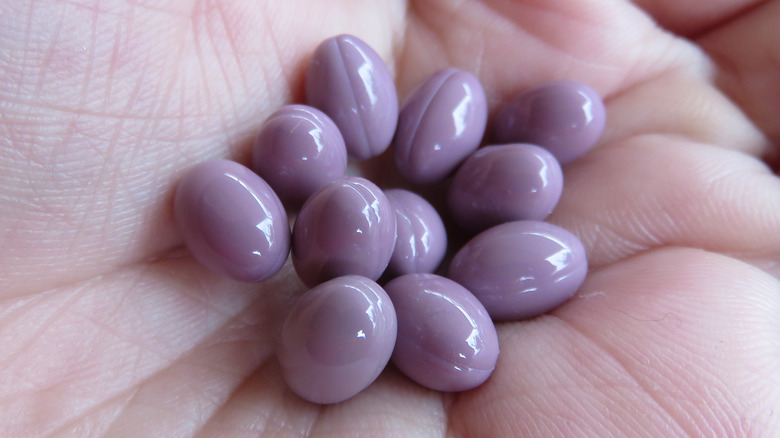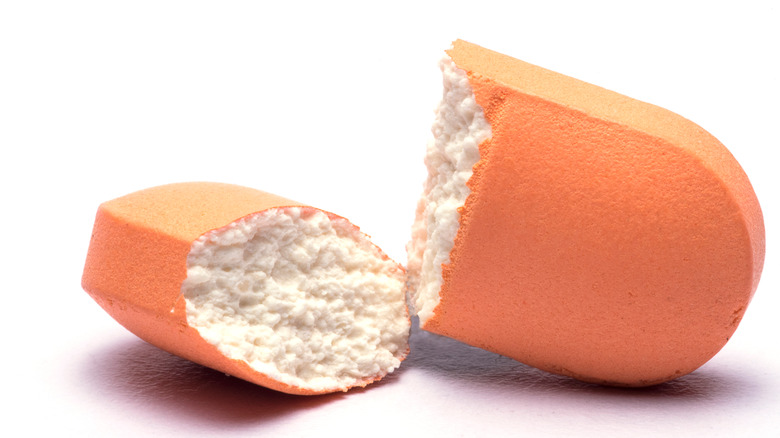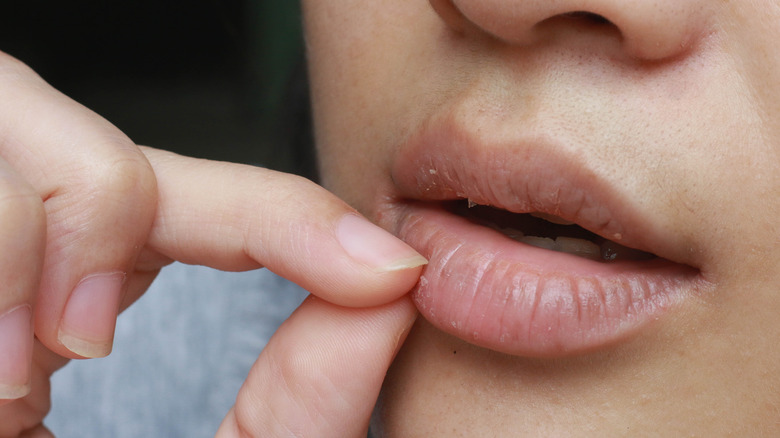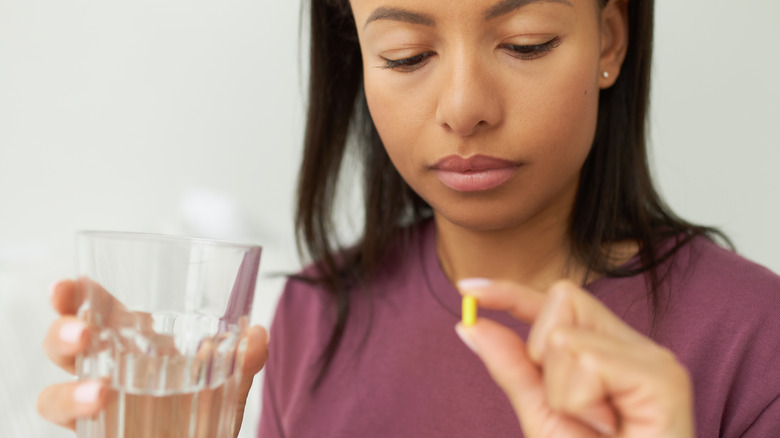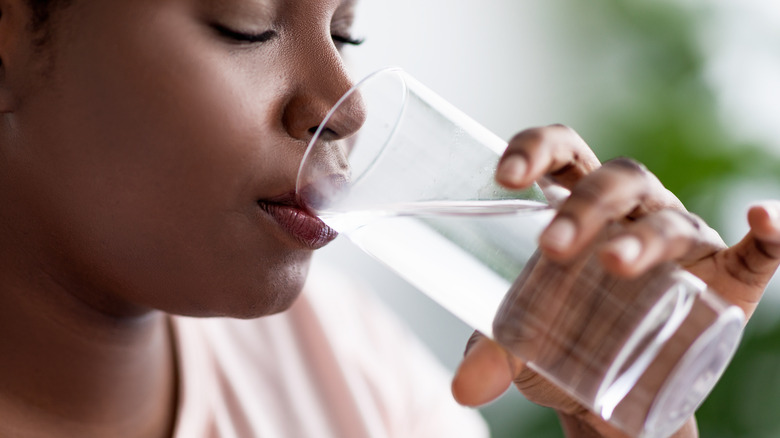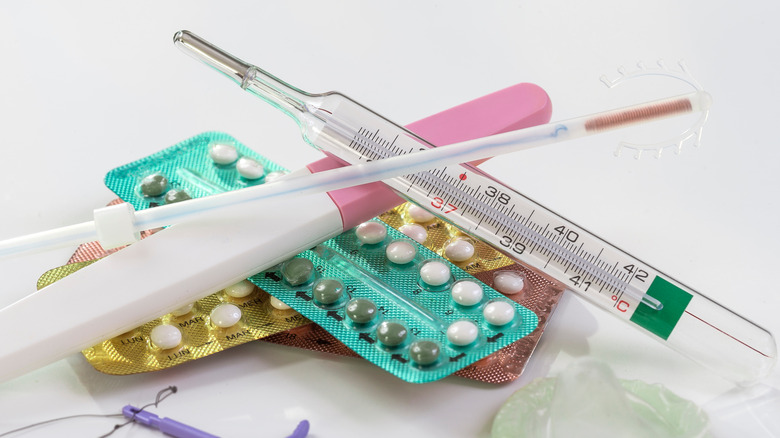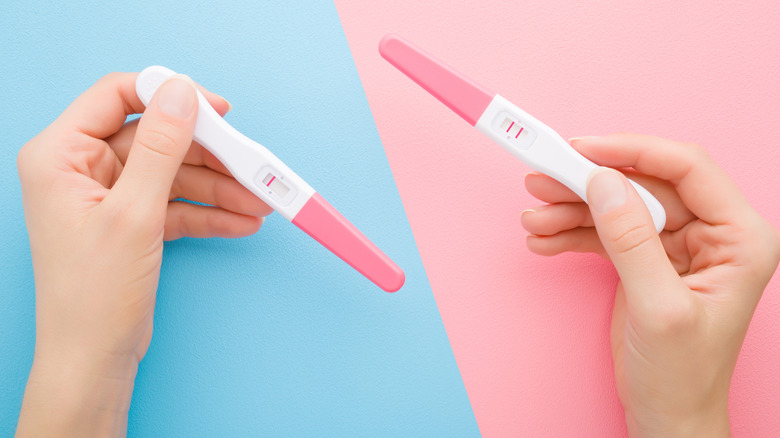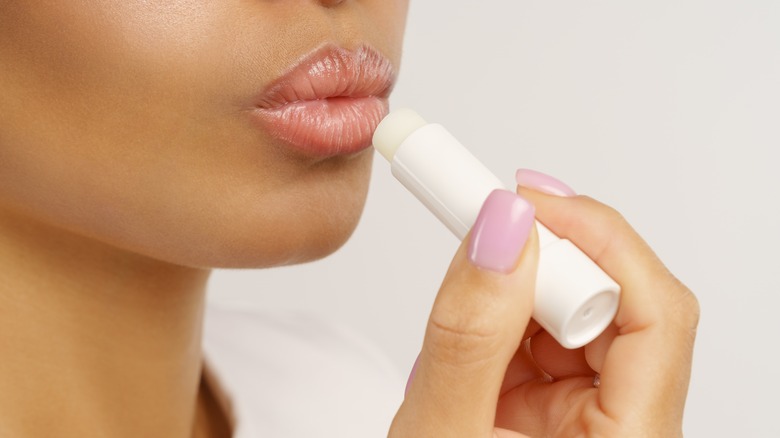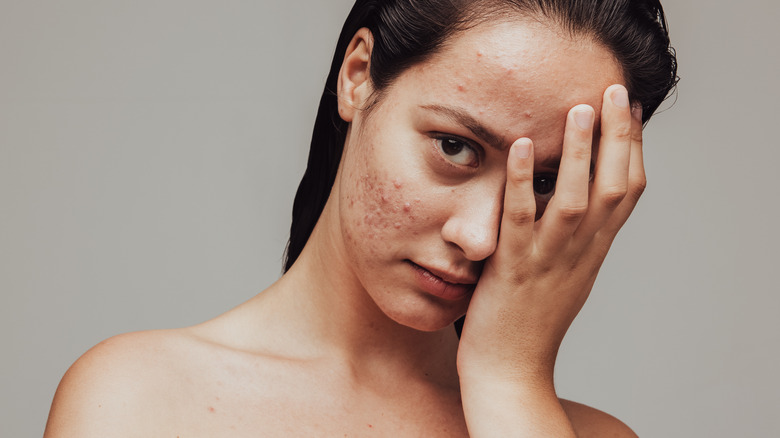Accutane Explained: Usage, Dosage, And Side Effects
Ever had a bad case of acne? Perhaps you've considered taking Accutane at some point. Your doctor or dermatologist might even have advised you to give the drug a try. If you felt reluctant to do that, you're not alone. After all, Accutane doesn't have the best reputation. Since it was first approved by the FDA in 1982, this drug has gotten a bad rap from many because of its side effects, with some lawsuits in tow (via the MedShadow Foundation). But is it really that bad? And could the benefit of finally getting clear skin outweigh the risks?
Dermatologists seem to agree that Accutane isn't nearly as scary as the internet makes it out to be. Cosmopolitan polled a few dermatologists who collectively treated over 2,200 patients with Accutane, and they revealed that fewer than 15 of their patients ended up dealing with severe side effects, which were either remedied by lowering the dosage or ending treatment.
Despite its reputation, Accutane is still the closest thing we have to a cure for acne. Even though Accutane was taken off the market a couple of years ago, it is now available as Isotretinoin, which does the exact same thing: Kick acne's butt for good. Most people still refer to it by its OG name, however, and we'll be doing the same for the purpose of this article. Read on for everything you need to know about Accutane, how to use it, and what side effects you can expect to deal with.
What is Accutane?
Accutane is actually an oral retinoid: It's a vitamin A derivative that works to eliminate acne for good, in most cases (via Healthline). This powerful drug works to reduce the size of your oil glands while also promoting skin cell renewal, Rachel Nazarian, M.D., told Cosmopolitan. In an interview with Fashionista, dermatologist Bobby Buka explained that Accutane also works to lower the levels of bacteria found in hair follicles, which, in turn, means that acne-causing bacteria can't find a comfy place to live. It's no surprise, then, that it also has an effect on the skin's overall bacterial makeup. "[W]e've learned that it also alters the skin's microbiome, the collection of good and bad bacteria, to mimic that of someone who doesn't have inflammatory acne," Nazarian says.
According to Harper's Bazaar, Accutane is literally the only drug out there that can "cure" acne. While it's not entirely fail-proof, it works better than anything else available on the market. While some great topical treatments and alternative medications exist, Accutane manages to deal with acne at the source because it can alter oil glands permanently, making it more difficult for acne to make a comeback in the future. In short, Accutane addresses the main causes of acne, like excess oil production, clogged pores, bacteria, and inflammation. Needless to say, it's an incredibly powerful drug.
Who is an ideal candidate for Accutane?
While it might be tempting to go on Accutane to get rid of pesky breakouts, there are usually some requirements you need to meet before your doctor will prescribe the drug. Speaking to Women's Health, dermatologist Debra Jaliman, M.D., explained that she usually only prescribes Accutane to patients who suffer from severe acne or are dealing with scarring. She added that since this drug is so potent, she only prescribes it as a last resort once patients already tried alternative treatments like antibiotics.
In an interview with Fashionista, dermatologist Bobby Buka said that your plans to get pregnant can also play a role when he decides whether or not to prescribe the drug. Since women can under no circumstances get pregnant while using Accutane, they'll need to be willing to commit to at least two methods of birth control while using the drug. Buka says you'll also have to ready yourself to fill out a stack of paperwork before you can finally get a prescription. Yes, it's quite a drag, but the results are usually worth it, and it will also show your doctor that you're taking it seriously. Buka says the main thing he looks for when he decides whether or not someone is an ideal candidate for Accutane is whether that person is responsible. "A good candidate is someone who is communicative with me, compliant with getting the medication on time and doing lab work, and relating things back to me," he explains.
What determines the dosage of Accutane you're prescribed?
Like with most medications, doctors can prescribe different doses of Accutane depending on the patient. Your age, weight, and the severity of your acne will all play a role. The most common dose prescribed is typically 0.5 to 1 milligram per kilogram (of your total weight) per day, according to the Mayo Clinic. Usually, your overall dosage will be divided into two doses per day, and you'll continue this dosage for around 15 to 20 weeks unless your doctor adjusts it in the meantime. If your acne is pretty severe, your doctor might prescribe a dose as high as 2 milligrams/kilogram/day, according to Drugs.com.
You should never take a day's dose in one go, since it has not been established whether it's safe to do so. You should also take care not to miss a dose if you can help it. If you do miss one, take it as soon as you remember (unless it's almost time for another dose, in which case it is advised that you skip it and simply take the next one).
Your doctor might suggest micro-dosing
If Accutane's long list of side effects makes you incredibly nervous, your dermatologist might suggest you try micro-dosing. This simply means that you'll be taking smaller doses for a longer period of time. Typically, people take between 40 and 80 milligrams of Accutane a day. With micro-dosing, you'll be looking at taking the drug either a few days a week or once a week. Dosages can range between 10 and 20 milligrams when taking it a couple of days in the week, or from 10 to 40 milligrams when taken just once a week. "There's a lot of variability on how people do it because there are no big, robust clinical trials that guide physicians on the way to prescribe low-dose," dermatologist Melissa Levin told Harper's Bazaar.
Levin says she typically suggests micro-dosing to patients who don't have severe acne, but also didn't see any results from other treatments like topical creams or antibiotics. She also sometimes prescribes it to patients who used Accutane in the past and had a relapse. "Studies show that even 12 months after treatment, there's still a 30 to 40 percent relapse, which is pretty high. So there are people who end up staying on a low dose for many years," Levin says.
Micro-dosing might still cause side effects
Even though dermatologists tend to recommend micro-dosing to protect patients from side effects, Accutane remains a potent drug, even when taken in lower doses, and you likely won't get to avoid all the risks.
With that said, micro-dosing can tone down the intensity of some of the most common side effects, like dryness. "There's sometimes a little cheilitis, which is chapped lips, or there's dry skin, but we're not seeing elevated triglyceride levels or liver anomalies, which are the scarier things that we worry about with isotretinoin," dermatologist Melissa Levin told Harper's Bazaar. It's important to keep in mind, however, that not all of Accutane's side effects are dose-related, which means you won't be escaping them even when you opt for micro-dosing, dermatologist Hadley King warns. This means you still won't be able to get pregnant, even while using lower doses.
Something else to keep in mind if you opt for micro-dosing is that you'll be using the medication for much longer, which means you'll also be dealing with the side effects and risks for an extended period of time. Instead of dealing with excessive dryness for a few months, you might be spending good money on lip balms for a year or longer. The same goes for becoming pregnant, and if starting a family is something you're eager to do, taking a higher dose from the get-go might be a better option.
How long will I need to take Accutane?
Accutane can be prescribed in various doses, and this will determine how long it takes to see results. How well your body adjusts to the drug will also have an impact on how long you'll have to take it. With that said, you'll likely start seeing some improvement a few weeks into treatment (via Cosmopolitan). Around the three-month mark, the results should start to become more visible (but again, this will depend on your dosage), and most patients see the final transformation when they reach the six-month mark. If you don't notice any improvement two months in, dermatologist Loretta Ciraldo, M.D., FAAD, told Glamour that you should ask your doctor about upping your dosage.
Speaking to Fashionista, dermatologist Bobby Buka said that his patients are typically acne-free after four months on the drug, but that's only if they can handle the stronger doses. "You can take a rowboat there with 20-milligram doses and get there in eight months, or you can take a speedboat with 120 milligrams and get there in four," he explains. For some people, especially women who struggle with hormonal acne in their mid-twenties, doctors might prescribe lower doses that are taken over a prolonged period of time. This is to decrease the likelihood of a relapse, according to a 2019 study published in the Brazilian Society of Dermatology.
How do I take Accutane tablets?
It's important to take your Accutane tablets as directed by your doctor. First of all, don't crush your tablets, and do not chew them, either. Drink your Accutane tablets as is with a glass of water. According to WebMD, it's also usually recommended you take Accutane with food. This is because food can actually help your body to absorb the drug into your bloodstream more efficiently, ensuring you get the most out of each dose. Considering how expensive this treatment is, you'd want to make sure your body is able to use the drug effectively. It's also recommended you don't lie down for about ten minutes after taking Accutane. Absorica, one of the various brands under which Accutane is available, has been approved by the FDA to be taken without food. If you use any other brand, make sure you don't take the drug on an empty stomach.
As for your prescription, take note that you need to fill it within seven days of your doctor prescribing it (via Drugs.com). You'll need to refill your prescription every 30 days, and you won't be able to get more than a month's worth of Accutane at a time. Last but not least, take the drug for as long as your doctor prescribes it (unless you experience severe side effects). Your acne might seem to get worse at first, but it will improve the longer you take Accutane.
You can't get pregnant while using Accutane
One of the biggest downsides to taking Accutane is that it's fatal to unborn babies, which means you can under no circumstances get pregnant while using this drug. This is taken very seriously in the United States, and women who can get pregnant need to register with iPLEDGE before they can start taking the drug, according to Healthline. iPLEDGE, which is a restricted distribution program approved by the FDA, aims to properly inform people about the risks Accutane poses to unborn babies while also providing information on how to best prevent pregnancy while using this medication.
Even after you stop taking Accutane, you'll have to wait four months before trying to conceive. Earlier than that could still pose a risk to the baby. Accutane can cause the fetus to die or induce premature birth. It can also cause miscarriage. If the baby survives, they are usually born with terrible birth defects, some of which include an underdeveloped brain. Other birth defects include missing eyes, heart defects, missing ears, deafness, a cleft palate, and even a missing thymus gland, which produces white blood cells. According to Drugs.com, even one dose of Accutane can lead to some of the abovementioned birth defects, so it is crucial you take every single precaution available to prevent pregnancy.
You'll have to commit to a healthy diet and routine medical tests
Speaking to Women's Health, dermatologist Debra Jaliman, M.D., said that patients on Accutane need to watch their intake of fatty foods and try to cut back on their alcohol consumption. This is because the drug can seriously mess with your cholesterol levels and has the potential to cause liver damage. "In general, it's recommended that people avoid alcohol while on isotretinoin," dermatologist Marisa Garshick told Cosmopolitan. Your liver is already working overtime to process the drug, and adding alcohol into the mix will leave you with the mother of all hangovers the next day, Garshick says.
You'll also have to undergo several pregnancy tests: Two before you start your first course of Accutane, and then every time before you get a new prescription. You'll have to take another pregnancy test after you finish Accutane, and then again 30 days after your last dose (via Drugs.com). You'll also need to get regular blood tests to ensure your body is tolerating the drug well, Jaliman says.
Severe dryness is a common side effect of Accutane
Ask anyone who's ever been on Accutane, and they'll tell you that the way it dries you out is one of the worst side effects. Dermatologist Debra Jaliman, M.D., told Women's Health that Accutane not only dries out the skin but also the nose and eyes. This means that those who wear contact lenses might experience some issues (via WebMD). Jaliman recommends having nose drops handy, as well as a very good moisturizer to hydrate your skin. You should also make sure you wear sunscreen whenever you brave the outdoors, since Accutane makes your skin more susceptible to sunburn and UV damage.
According to WebMD, you might also notice that your mouth is drier than usual, and because Accutane dries out your nose as well, you might be more susceptible to nosebleeds. All of these pesky side effects will subside once you stop taking the drug.
Some people experience depression while on Accutane
Some people experience depressive symptoms while on Accutane, but a direct link between the drug and depression has not yet been established. "Scientifically, there's no correlation between isotretinoin and depression or anxiety, but anecdotally, I see it in 10 percent or less of patients," dermatologist Mona Gohara, M.D., told Cosmopolitan.
A 2005 study published in the British Journal of General Practice could find no causal relationship between the use of Accutane and depression, but noted that a link might exist, albeit rare. It concluded that the very small possibility of Accutane causing depression is not a good enough reason to withhold treatment from patients, and those who do suffer from depression should be monitored carefully by their doctor. "If somebody has a pre-existing mental health condition or is seeing a mental healthcare provider, I make sure that provider is on board with Accutane before I even start it, and that we are in really close contact so we can quickly lower the patient's dose or come off of the medication ASAP if need be," Gohara says.
If you or someone you know needs help with mental health, please contact the Crisis Text Line by texting HOME to 741741, call the National Alliance on Mental Illness helpline at 1-800-950-NAMI (6264), or visit the National Institute of Mental Health website.
Accutane can cause some more serious side effects
Even if you're okay with the common side effects of Accutane, it's important to know about the more severe side effects of the drug before you take it. "Other side effects that may be seen include hair thinning, decreased night vision, and joint and muscle aches and pains," dermatologist Hadley King, M.D., told Harper's Bazaar. While these conditions are serious, they usually disappear when you stop taking the drug.
Other more serious side effects include increased pressure in your brain, high triglyceride levels, and liver damage. The drug has also been linked to inflammatory bowel disease and IBS, but the latter was proven to be coincidental and not a direct side effect of the drug by a study, dermatologist Bobby Buka told Fashionista. A 2019 study published in the Brazilian Society of Dermatology also notes that additional studies found no link between inflammatory bowel disease and Accutane.
Very serious side effects that you need to report to your doctor immediately include chest pain, rectal bleeding, serious diarrhea, dark urine, yellow eyes and skin, changes in your vision, and intense headaches (via WebMD). Accutane can also cause pancreatitis, although this is usually treated successfully.
Accutane can have some long-term side effects
Accutane's effect on your skin can be long-lasting, but so can some of its side effects, unfortunately. While most of Accutane's common side effects will subside once you stop taking the drug, some might linger.
According to Medical News Today, some long-term side effects might include internal organ damage and vision loss, as well as scarring. A 2018 study review published in the International Journal of Risk and Safety in Medicine found that some people experience sexual dysfunction after using the drug.
A 2010 study published in The BMJ also found that some people were at risk of attempting suicide up to six months post-treatment. It was also noted that the same people's risk of suicide was much lower after completing a course of Accutane than it was before they started taking the drug, which the study concluded means that, for now, there's no proof that Accutane is the direct cause of suicide attempts in people with depression. If anything, it helps lower the risk.
If you or anyone you know is having suicidal thoughts, please call the National Suicide Prevention Lifeline by dialing 988 or by calling 1-800-273-TALK (8255).
Your acne might come back after you stop Accutane
The unfortunate thing about Accutane is that while it will clear your acne while you're taking it, you might relapse once you stop treatment — we know, it's so not fair. However, for many people, the treatment gets rid of their severe acne permanently, and even though they might deal with breakouts again, chances are they won't be nearly as bad as before treatment.
"I would say only five percent of my patients go on isotretinoin a second time, either because their acne came back in full, or because they're getting some breakouts that they don't want to deal with again," dermatologist Mona Gohara, M.D., told Cosmopolitan. She added that another five percent typically deal with breakouts that are successfully treated with antibiotics and retinoids. A whopping 90% of Gohara's patients never deal with breakouts again.
Unfortunately, these numbers aren't a realistic picture when it comes to the overall population. In fact, dermatologist Bobby Buka told Fashionista that one in every 20 of his patients usually needs to use Accutane for a second time. A 2020 study published in the Saudi Pharmaceutical Journal that included 427 participants found that, of the 57% of patients that used Isotretinoin, 45.12% experienced a relapse. Another study published in the Journal of Drugs in Dermatology found that, of the 405 participants that took Accutane, 94 relapsed, of which 76 dealt with acne again two years after initially stopping treatment.

